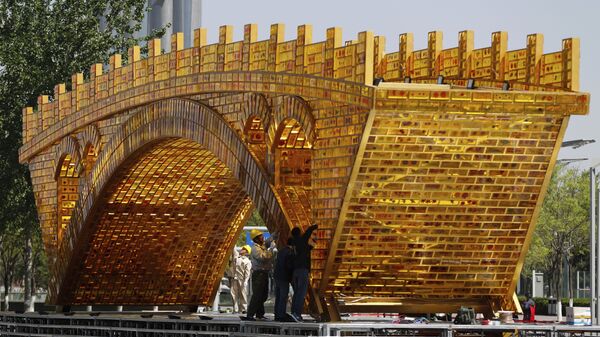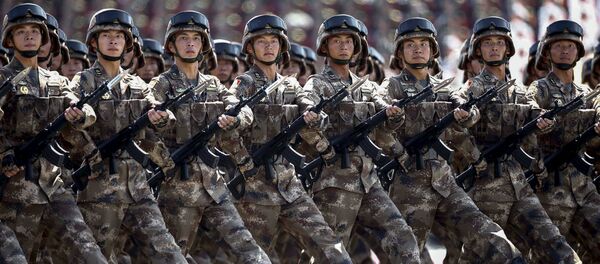New Delhi (Sputnik): India has questioned whether China's's multi-billion dollar Belt and Road Initiative (BRI) is indeed an inclusive economic initiative aimed at promoting the "international public good", but its concerns have been dismissed by Beijing. However, this shouldn't surprise anyone, analysts told Sputnik on Tuesday.
"If you look at the recent statement of the spokesperson of India's Ministry of External Affairs, Mr. Ravish Kumar, he has very clearly listed three or four key reasons for India's decision not to participate in the second BRF. One is the sovereignty issue, the second is the issue of predatory or debt financing, the third is the fact that the BRI and by extension the CPEC is causing and will continue to cause environmental degradation and the fourth I cannot recall immediately. Formally, China and India are maintaining the status quo on BRI, but I believe they would be engaging informally on the issue. China also cannot afford to ignore India in the long-term on its concerns over CPEC because India could also revive its One China policy and harden its stance on Tibet and Taiwan, both of which are core issues for China," Professor Srikanth Kondapalli, a India-China specialist at the Centre for East Asian Studies of the School of International Studies at the New Delhi-located Jawaharlal Nehru University (JNU), told Sputnik.
"The message that China is putting out is that it understands India's concerns over the BRI and the CPEC, while at the same time showing a willingness to be patient on the issue of India's participation in the BRI. In a sense, I would say that it is not a ‘carrot and stick policy' that it is following vis-à-vis India, but rather sending out a ‘carrot and caution' message, wherein the ‘carrot' element suggests that China is conceding its keenness to see India participate in the second Belt and Road Forum (BRF), while the ‘caution' element suggests that [Beijing] is not going to wait forever for India to join," Professor Alka Acharya, another India-China specialist at the Centre for East Asian Studies of the School of International Studies at the New Delhi-located Jawaharlal Nehru University told Sputnik.
READ MORE: Chinese Belt and Road Plan Shouldn't Become Political Tool — Italy's Lega
Professor Acharya also maintained that India's non-participation in the second Belt and Road Forum, to be held in Beijing next week, would not in any way affect existing bilateral relations between the two countries.
"No, I don't believe relations between India and China will be affected because of India's non-participation in the BRF. If you see, Indian PM Modi is not talking at all about China during his election campaign. His focus is only on Pakistan. That itself is points to the healthy relationship that India enjoys with China," Professor Acharya told Sputnik.
China's foreign ministry spokesperson Lu Kang was quoted as saying on Monday that the BRI is a transparent, inclusive economic cooperation and connectivity initiative only and does not involve any territorial or maritime disputes.
India has consistently opted not to be part of the BRI project because it maintains that the over-60-billion-dollar China-Pakistan Economic Corridor (CPEC), which is a part of it, passes through part of the disputed northern region of Kashmir, which has been held and administered by Pakistan for the past 71 years.
READ MORE: China Slams Indian Report About BRI Facing 'Push Back' in the Region
China has invited India to attend the second Belt and Road Forum, to be held in national capital Beijing from 25 to 27 April, but India has not accepted the invitation, citing its concerns over territorial integrity and sovereignty, a report in the English newspaper Hindustan Times read.
"The BRI does not respect India's concerns of sovereignty and territorial integrity," Chinese state media quoted India's Ambassador to China, Vikram Mistri, as saying last month.
"Whether the Indian side will participate in the Belt and Road Forum (BRF), I think you need to ask the Indian side for a more specific answer. But here I'd like to re-emphasise that the BRI is proposed by China but it is already an international public good," Lu said.
READ MORE: India’s Rejection of 'One Belt One Road' Was Premature, Claim Pundits
He said that some countries may lose opportunities because of their decision not to participate in the BRF.
The Belt and Road Initiative (BRI), also known as the One Belt One Road (OBOR)) or the Silk Road Economic Belt and the 21st-century Maritime Silk Road involves infrastructure development and investments in 152 countries and international organisations in Europe, Asia, the Middle East, Latin America and Africa. "Belt" refers to the overland routes for road and rail transportation, called "the Silk Road Economic Belt"; whereas "road" refers to the sea routes or the 21st Century Maritime Silk Road. Until 2016, the initiative was officially known in English as the One Belt and One Road (OBOR) initiative but the official name was changed as the Chinese government considered the emphasis on the word "one" as being prone to misinterpretation.
The proposed land and maritime networks are being constructed along six corridors with the aim of improving regional integration, increasing trade and stimulating economic growth.
The views and opinions expressed by speakers in this article are their own and do not necessarily reflect the position of Sputnik.




